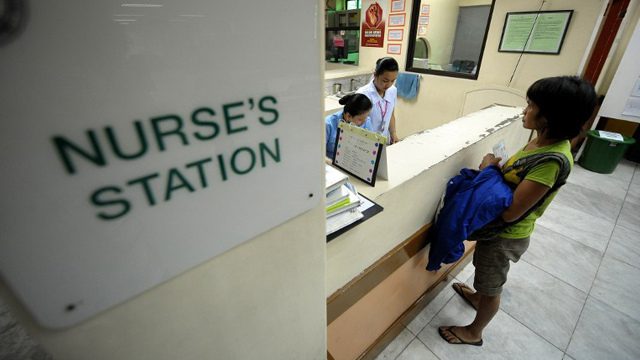SUMMARY
This is AI generated summarization, which may have errors. For context, always refer to the full article.

MANILA, Philippines – The Senate approved on Wednesday, October 10, the Universal Health Care (UHC) bill seeking to give all Filipinos access to health care coverage and services.
Senate Bill 1896 or the Universal Health Care for All Filipinos Bill seeks to automatically enrol Filipinos into a “National Health Insurance program,” under which membership will be either contributory, meaning those who can pay health premiums, or non-contributory, or those sponsored such as senior citizens and indigents.
The Senate’s passage of the bill comes over a year after lawmakers in the House of Representatives passed a counterpart measure in September 2017.
The measure is still far from becoming law, though, as a bicameral conference committee would need to reconcile the different provisions in two versions of the bill.
The Senate passed the bill after Malacañang delivered on Wednesday, a certificate of urgency on the UHC bill. President Rodrigo Duterte earlier urged Congress to pass the UHC bill during his 3rd State of the Nation Address (SONA).
What the Senate version wants: Apart from automatic health insurance, the bills seek to expand the Philippine Health Insurance System’ (PhilHealth) coverage to include free consultation fees, laboratory tests, and other diagnostic services.
Filipinos would also be allowed to avail of primary health services even without PhilHealth cards.
Should the bill be passed, premium PhilHealth subsidies will also be adjusted and included in the government’s annual budget. This would allow Filipinos who are not yet enrolled in PhilHealth once the measure becomes law to avail of health services.
“Financial issues will no longer be a burden to our countrymen when it comes to healthcare,” Senator JV Ejercito said during his speech sponsoring the bill.
Apart from this, the bill also seeks to connect health services and referrals in provinces and cities.
In a statement Wednesday, October 10, Health Secretary Francisco Duque said Service Delivery Networks would be established to provide all Filipinos primary health care. Both public and private health services providers will also take part in ensuring all Filipinos will have a primary care provider team.
The bill also seeks to improve the doctor-to-patient ratio and increase the number of hospital beds and equipment. It also calls for the establishment of hospitals in remote areas. Currently, the Department of Health recorded doctor-to-patient ratio at 1 doctor to 33,000 people while bed to population ratio was at 1 bed to 1,121 people.
To do this, the bill would call for “reforms” in the mandate, responsibilities, and jurisdiction of agencies that will be involved in implementing UHC. These include the DOH, PhilHealth, and local government units (LGUs), among others. (Duque: Access to primary health care depends on coordination with LGUs)
In addition to this, all graduates of health-related courses from state universities and colleges as well government-funded scholarship programs will need to complete at least 3 years of mandatory government service.
Should the bill become law, Duque said it would signal movement “from a system used to taking care of the sick to one that is used to keeping people healthy.” – Rappler.com
Add a comment
How does this make you feel?
There are no comments yet. Add your comment to start the conversation.